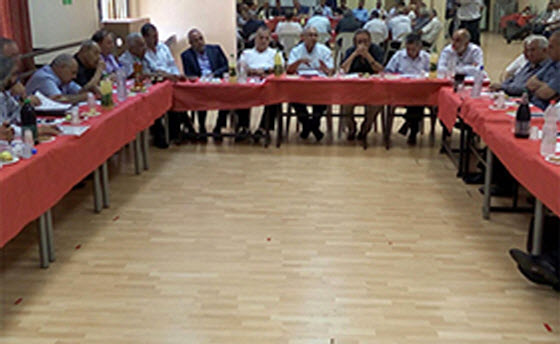A week before the new school year is set to begin, the Local Arab Councils have still not received the funds owed to them to begin the school year. While the Ministry of Education is well aware of the terrible shortage of classrooms in the Arab sector (the phenomenon of the “sardine can,” particularly dire for the Arab sector in Israel), it has still not agreed to authorize the construction of new classrooms.
On Wednesday, August 26, a week before the start of the new school year, the heads of the Local Arab Councils convened in Sakhnin for an emergency meeting. There the participants indicated that the Ministry of Education has so far not transferred the funds needed to start the school year in the Arab sector nor has it seen fit to alleviate the huge shortage of classrooms in these communities. At the end of the meeting the heads of the local councils announced that without required budgets and classrooms “we will strike the opening of the school year until further notice.”

Emergency meeting of the Heads of the Local Arab Councils in Sahknin, August 26, 2015 (Photo: On The Left Side)
More than 65 heads of Local Arab Councils participated in the meeting. In addition to their decision to call for a strike of the opening of the school year, the heads of the local councils decided to set up protest tents at the entrances to the Office of the Prime Minister and the Knesset. Among the participants there were also those who suggested bringing the crisis to the attention of international organizations.
Chairman of the Committee of the Heads of Arab Local Councils, Mazen Ghanaym, Mayor of Sakhnin, said after the meeting: “We angrily condemn and express disappointment at the failure of the Prime Minister’s Office and the Ministry of Finance to reply to us. We have prepared a working paper, and the ministries are aware of our demands: we’re asking for 6 billion shekels a year.”
Regarding the critical shortage of classrooms, the chairman of the NGO Mossawa, Jafar Farah, added : “Despite the fact that senior Israeli politicians have announced their intention to introduce affirmative action for the Arab sector, on the ground we don’t see any results. There is a serious problem in infrastructure in the Arab communities, and a grave shortage of schools and classrooms. The “sardine can” phenomenon is very prominent in the Arab sector, but there is no response from the ministries to the demands of the Arab society in Israel,”
The meeting was also attended by Knesset members from the Joint List. At the end of the meeting, MK Osama Saadi said: “We will support the measures being taken by the local councils, and we agree to the idea of holding a demonstration in Jerusalem so that these voices will be heard there as well. We’re talking about a demand to receive only 1% of the entire state budget, which is nothing for a sector which constitutes 20% of the population.”
Observers have commented that the absence of coverage in the Hebrew-language media of the meeting and its decisions is both glaring and disturbing: there has been nothing in news broadcasts on radio or television, nor has a word been written about it in Haaretz. Coverage of the meeting and its decision was only briefly mentioned in the daily Hebrew-language newspaper Yidioth Achrontot.
All persons, including Jews, who are concerned about discrimination against Arab pupils are urged to join the sit-in tent in Jerusalem, to clearly support for the idea that education is essential for all the children of Israel, Arab children too.


